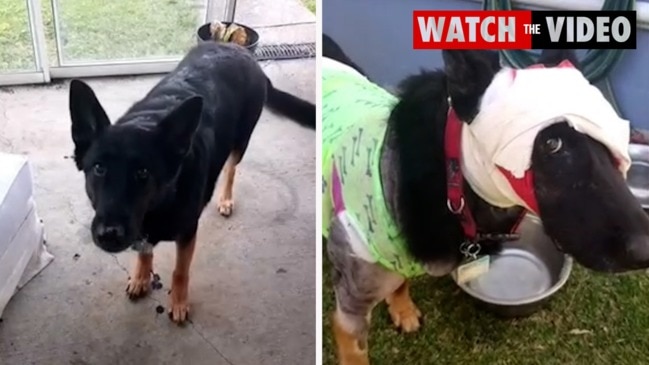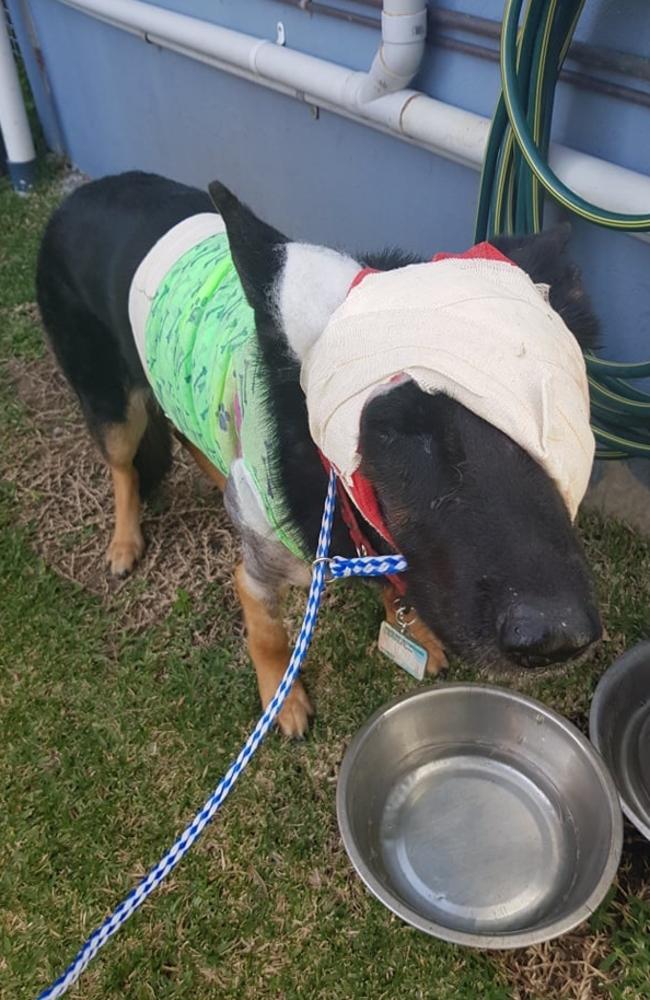A PTSD assistance dog who helps her owner advocate for veterans needs help of her own
A former soldier who credits his assistance dog with helping to turn his life around says the german shepherd is now in need of her own life saving help.

Once a drug addict and self-described “nasty” person, Glenn Marskell now spends his time campaigning for and helping save the lives of fellow veterans with his sidekick, Dakota the German Shepherd.
“I’ve spent many nights on the phone (with suicidal) strangers just to get them to the next day” he says.
“They could be overdosing on pills or drugs. You don’t know what they’re doing on the other side, but, if they’re talking, they’re alive.”
Mr Marskell, 59, credits turning his post-military life around in part thanks to others advocating for him and to Dakota, his certified post-traumatic stress disorder (PTSD) assistance dog.
But Dakota was now the one in need of help after undergoing an $8000 operation.

Mr Marskell, a former Brisbane resident who was diagnosed with PTSD as a result of trauma sustained during his time in the full-time Army between 1979 and 1984, said he would not be alive today if it were not for Dakota.
“She has trained me to be a better person,” he said.
“I’ve tried to take my life 10 times because of the b******t over the years.
“But, I’m an awareness campaigner now. I’ve become a voice to the voiceless with the help of my dog.”
A grassroots ambassador for the Anzac Ribbon group, part of the Wounded Warriors 4 Wounded Warriors organisation, Mr Marskell and Dakota travel the country in his specially designed Anzac Ribbon Tribute SS car, helping raise awareness about veteran suicide and mental health.

“She’s with me everywhere. She is my calming voice,” he said.
Now, the 6-year-old Ipswich-born dog needs some help of her own, after undergoing a sternotomy, a potentially lifesaving surgery where her chest was opened to remove a tumour and a pus-filled lung lobe.
A GoFundMe account, titled Miss Dakota Needs Your Helping Hand, has been set up to help pay for Dakota’s treatment which has so far climbed to about $10,000, including the surgery and hospital stay at the Port Macquarie Veterinary Hospital near Mr Marskell’s home.
Veterinary surgeon Chris Livingston, 46, said the dog’s first unexplained illness started in November and, after, several months of tests and different treatments a tumour was discovered in her chest, a lung lobe was full of pus instead of air, she had localised pneumonia and her oesophagus was dilated, causing her to regurgitate food as it was aspirating into her lung, instead of making it into her stomach.

Dakota was eventually diagnosed with myasthenia gravis, a rare neuromuscular disease that causes weakness in the skeletal muscles, especially the ones responsible for breathing and movement of the limbs.
“She was at great risk of continuing to aspirate and getting pneumonia or eventually dying from that,” Dr Livingston said.
Because Mr Marskell obtained Dakota prior to the Department of Veterans Affairs (DVA) introducing a Psychiatric Assistance Dog Program in 2019, he is not eligible for financial help for her veterinary bills from the government.
The program provides psychiatric assistance dogs to veterans diagnosed with PTSD and covers most annual costs including vet bills.

But, the program “cannot provide financial assistance or reimbursements for assistance dogs privately sourced outside of the DVA program,” according to the DVA web site.
Mr Marskell said Dakota was born in 2015 at the Royal Australian Air Force Base (RAAF) Amberley, outside of Ipswich, and was being trained to become an explosives detection dog.
When she failed the aggression phase of the training, Dakota was donated to the now defunct Ruff Love, a veterans charity that provided assistance dogs to veterans and first responders with PTSD.

She was 18 months old when Ruff Love sent her to Mr Marskell’s home, where she improved his life for the better.
“I used to be triggered and would be having nightmares in the middle of the night,” he said.
“Sometimes I’d lock myself away for four to five days in a dark room.
“I wouldn’t eat, drink, or go to the toilet. I’d just be a nasty person and beat myself up in my head.
“I’d come out the other side of being triggered and see a smashed-up house and wonder ‘what’s happened here?’ I wouldn’t remember doing it.”
The creator of the Veteran’s Lives Matter Australia Facebook page said Dakota now regularly woke him up if he started having a nightmare.
At first, Mr Marskell was speechless to describe the difference that one thing had made in his life.
“It’s like winning lotto,” he said.

“Then, I know I can get my brain back to stable and I’m not damaging my property, or, if I’m in a relationship or the kids or grandkids are around, I’m not upsetting them.
“There are so many positives. Dakota keeps me in the here and now, and not in the darkness.
“I reflect less and less on the darkness and more on the positive.”
Mr Marskell, who also served in the Army reserves with the Brisbane-based 9th Battalion, Royal Queensland Regiment (9RQR) in the late 1980s, said he started taking amphetamines to cope with trauma he sustained during his earlier Army career.
He said that addiction carried over into his civilian life when he became an interstate truck driver to “stay away” from people, but he had now been clean for 17 years and thrived on helping other veterans.


